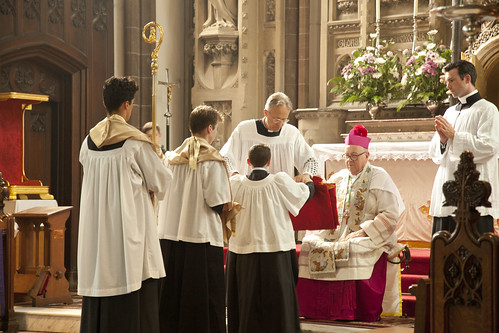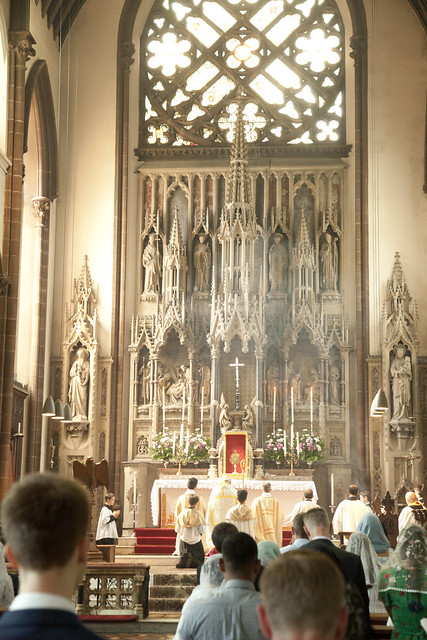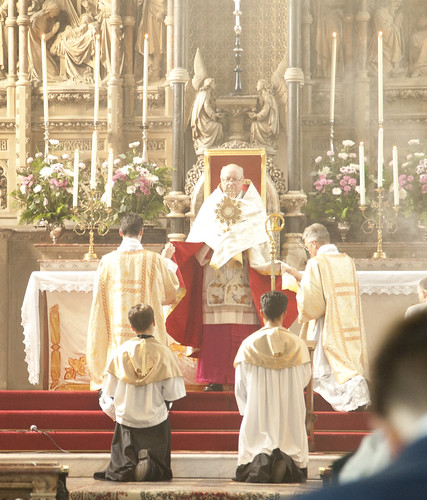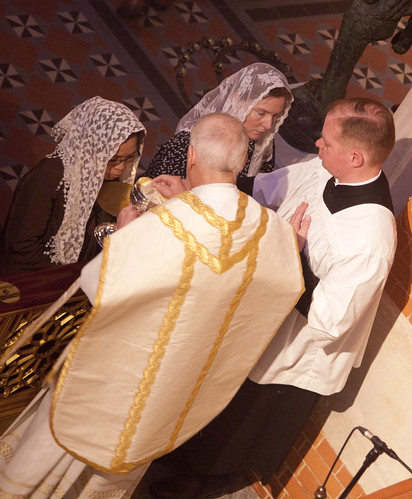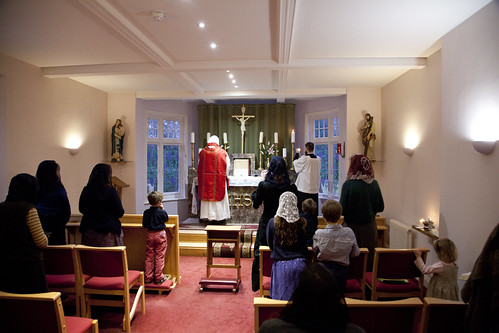Chairman's Blog
Interview in The European Conservative
Dr. Shaw, at the beginning of this year, Os Justi Press published your latest book The Liturgy, the Family, and the Crisis of Modernity, which I read with considerable enjoyment. I wanted to speak with you today on some further questions arising from your discussion in that book of the family and its place in the modern world. Based on your experience, can you say something about how large, traditional Catholic families, which have become something of a stereotype, differ from the current socially dominant type?
Having a large family tends to push one into a more old-fashioned approach to raising children, and away from either of the two extremes modern families fall into. One of those extremes is what we might call the ‘hippy’ model, in which you let your children do whatever they like. This is manifested in the attitude that parents should allow their children to choose for themselves what religion to have, or even how to spell. The other extreme is the ‘tiger mum’ or ‘helicopter’ model: it’s as if the parents are hovering over their children checking everything they do, and intervening if things don’t go as they want them to, and intervening in minor conflicts the child might have even when they are young adults—at university or in employment.
With a large family you can’t allow every child complete freedom, because there would quickly be conflict between the children. You also can’t try to control everything they do, since that is simply impossible. You find yourself governing a community, setting a framework for young people who have a lot of freedom but need to exercise that freedom in ways that do not impinge negatively on each other. But this is not like the liberal ideal of neutrality, since no family can be value-neutral. From the pictures on the walls to the shared activities, parents have to feed their children’s emotional and spiritual lives.
Stuart Chessman review The Liturgy, the Family, and the Crisis of Modernity
Mr Stuart Chessman of the Society of St Hugh of Cluny has been kind enough to review my book The Liturgy, the Family, and the Crisis of Modernity on his blog.
Mr. Joseph Shaw, the chairman of the Latin Mass Society of England and Wales and president of the International Una Voce Federation, offers us a book of reflections on the Church and society of today and especially on the position of the Traditional Catholic Movement. Even though the author taught philosophy at Oxford University for many years, The Liturgy, the Family and the Crisis of Modernity is no abstract treatise. Our author, by virtue of his office, is squarely in the midst of the liturgical wars of today. Shaw returns again and again to the refutation of attacks launched against Traditionalists by their enemies within the Church. The Liturgy, the Family and the Crisis of Modernity serves, first of all, as a valuable arsenal of information and arguments for the Traditionalist. And this is an honorable role! Wasn’t the City of God also inspired by the need to respond to contemporary calumnies against Christians after the fall of Rome?
Shaw, however, goes far beyond the role of a controversialist. He works to understand what is happening in the Church today. In contrast to most commentators on liturgical issues, Shaw knows that the Church is embedded in history and in society. As the title of this collection of essays indicates, liturgical questions cannot be severed from other theological issues and from the daily life and experience of the faithful. This book develops these interactions and influences. Shaw sets the controversies and deviations of the moment in a broader historical, philosophical and sociological context. This deeper understanding will be necessary to the Traditionalist in the continued conflict between the Church establishment and Catholic Tradition – a struggle that may last years, decades or even generations.
Read it all there.
See more about the book here.
Support the Latin Mass Society
Confirmations in Warrington
On Saturday I was privileged to be present at the confirmation of 22 children and adults at St Mary's, Warrington, a church belonging to the Fraternity of St Peter (FSSP). The FSSP has the privilege of the use of all the liturgical books of 1962 so this was perfectly licit, and the confirmations were carried out by the local ordinary, Archbishop Malcolm McMahon OP.
How to obey the Church in the liturgy
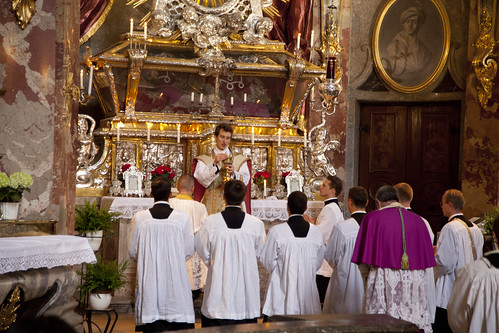 |
| Maybe... like this. |
My latest for OnePeterFive
When theologians want to discern the “teaching of the Church” they may be able to pick out some “extraordinary” act of the magisterium, such as an ex cathedra definition by the Pope, but very often there isn’t one available. This being so, they go to Scripture and Tradition, as containing the Deposit of Faith: they will tell us what the Church teaches. The Fathers and Doctors are witnesses to the Tradition and also draw out its implications. This is the “ordinary” magisterium of the Church, and the ordinary way in which the Church passes on the teaching which has been entrusted to her by our Lord.
This is how, ordinarily, God has chosen to reveal Himself to us; this is how, ordinarily, the Holy Spirit speaks to the Church: through what has been passed down. When people are moved to overturn established Tradition in favor of a radical new reading of Scripture, perhaps inspired by a private revelation, we can expect to hear some heresy.
This I hope is not controversial, but when it comes to the liturgy a very different attitude often takes hold. Liturgical progressives tell us that the Spirit has called them, or is calling the entire Church, to adopt some liturgical innovation: to take just one example, consider the service of the altar by females (altar girls). This overturns a tradition of only men and boys serving at Mass going back as far as the records go, which is the late 4th century (see canon 44 of the Collection of Laodicea).
Communion in the Hand for Catholic Answers
My latest for Catholic Answers.
A perennial source of debate, and occasionally of conflict, is the way we receive Holy Communion. In this article I would like to examine one of the sources often cited in this debate and place the issue into some historical context.
Letter in the Catholic Herald from Sir Edward Leigh MP
Sir Edward Leigh, the distinguished Catholic Member of Parliament, recently agreed to be one of the Latin Mass Society's Patrons. I was delighted to see this letter from him in the current Catholic Herald.
Catholic Herald, Letters, June 2023
Keep the old Mass alive
Sir — I was appalled to read in the Catholic Herald of
the way in which bishops are restricting the Traditional Latin Mass (April
2023). In a world beset by rampant indifference to religion, what possible harm
is caused by a few faithful attending a form of Mass which has been used for
centuries? I do not write on my own behalf; I am very content to attend the
new-rite Latin Mass at 10.30am in Westminster Cathedral every day. It is a good
compromise and the sung version on Saturday morning is wonderful. But for many,
particularly for young people, the old rite is a beautiful and calm spiritual
experience, so unlike the rest of our busy, crowded lives. Some people do not
find the stream of everyday English in the Mass a joyful experience. Many of
our ancestors — including, in my family, Blessed Richard Leigh, who went to
Tyburn in 1588 — suffered greatly, even to the point of martyrdom, to say and
attend the old Mass in England and thus keep the Faith alive. Surely we should
allow its use in their memory, if nothing else.
(Sir) Edward Leigh MP
London, UK
Ad orientem at the Last Supper; Hebrew from the Cross
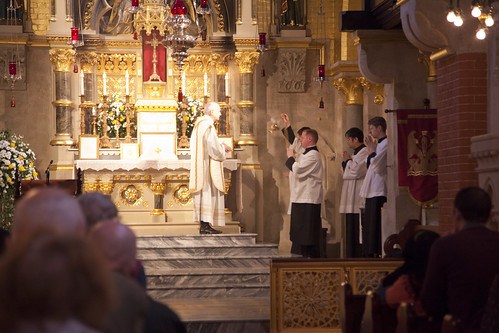 |
| Mass at Corpus Christi Maiden Lane |
The Tablet has published a letter from me in the ongoing discussion of the celebration of Mass 'ad orientem', facing the apse. It is remarkable how people have strong feeling about this (and many other things) and just assume that the Scriptures support them.
I could have added that the Mass, while it certainly memorialises both the Last Supper and Calvary, is also a continuation of the Temple and Synagogue traditions, and the heavenly liturgy described in the Apocolypse. Although certainly a liturgy, what happened at the Last Supper is not some kind of template for Mass, as if the question of 'facing the people' could be settled on that basis.
Sir,
Peter Simmons informs us that at the Last Supper and at Calvary Jesus ‘faced those who were present and spoke to them in their own language.’ It would seem Mr Simmons’s imagination is more powerful than the facts.
The awkwardness of seeing and conversing with Christ as he was reclining at the head of the table at the Last Supper, with the Apostles arranged in a row on the same side as depicted in ancient mosaics, is reflected in the need for St Peter to pass a message to Him via the Beloved Disciple (John 13:22ff). Moreover He would certainly have addressed them at a Passover meal in the liturgical language, Hebrew, and not the day-to-day language, Aramaic, just as Jews do to this day.
On the cross Jesus’ use of Hebrew actually caused confusion and misunderstanding: hearing the Hebrew ‘Eli’, ‘Lord’, bystanders thought He meant ‘Elijah’ (Matt 27:46ff). He didn’t care, because He was addressing not them, but His Heavenly Father. As Mr Simmons says, this is a lesson for us.
Yours faithfully,
Joseph Shaw
Chairman of the Latin Mass Society
Take children to Mass
My latest on Catholic Answers.
The presence and management of children at Mass is an issue that can generate more heat than light. I would like to tackle it here on the basis of a slightly deeper set of principles than is usual.
Full disclosure: I am a father of nine; my youngest has recently turned three. We have had to manage a child under five at Mass since our first was born in 2003; for most of the time, we’ve had two under five. That may sound extreme, but a couple who have three children at three-year intervals will have a child under five, and sometimes two of them, for fourteen years. This is a big chunk of your life.
The first question is whether bringing small children to Mass is good in principle. Children under the “age of reason” (usually about seven) are not bound by canon law to attend Mass. Often parents have no choice but to bring them in order to attend themselves. But supposing they had the choice—if they could attend different Masses, or leave the children with friends—is the ideal to bring them or leave them behind?
Letter to the Tablet, from 1965
 |
| The tenth station: Jesus is stripped. Fr the Church of SS Gregory & Augustine's, Oxford |


